The Ceramic Frit Market is estimated to be valued at USD 4.1 billion in 2025 and is projected to reach USD 7.0 billion by 2035, registering a compound annual growth rate (CAGR) of 5.4% over the forecast period.
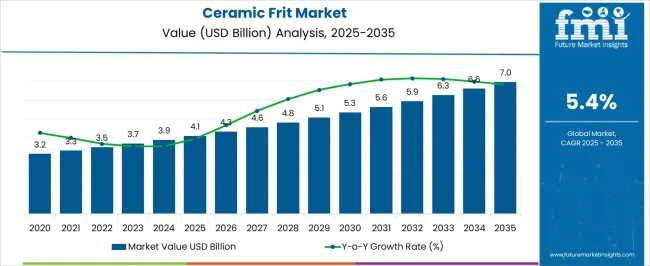
| Metric | Value |
|---|---|
| Ceramic Frit Market Estimated Value in (2025 E) | USD 4.1 billion |
| Ceramic Frit Market Forecast Value in (2035 F) | USD 7.0 billion |
| Forecast CAGR (2025 to 2035) | 5.4% |
The Ceramic Frit market is experiencing steady growth driven by its crucial role in enhancing the surface properties, durability, and aesthetic appeal of glass and ceramic products. Increasing demand from both decorative and functional glass applications has reinforced the adoption of ceramic frits across the global market. The current market scenario reflects strong adoption in industries focusing on high-quality architectural glass, automotive glass, and consumer products, where performance consistency and visual appeal are essential.
Growth is also being influenced by advancements in frit formulations that allow customization of color, texture, and opacity while ensuring chemical and thermal stability. Investments in modern production technologies, coupled with rising consumer preference for premium glass designs, have strengthened the market outlook.
The integration of environmentally friendly and low-emission frits has further expanded market potential, particularly in regions with stringent environmental regulations As end-use industries continue to prioritize sustainability, aesthetic differentiation, and functional efficiency, the Ceramic Frit market is expected to witness consistent expansion over the coming years.
The ceramic frit market is segmented by type, application, application method, and geographic regions. By type, ceramic frit market is divided into Alkaline-boron frit, Strontium-barium frit, Zinc frit, Magnesium frit, Lithium frit, Zinc free calcium frit, and Boron free frit. In terms of application, ceramic frit market is classified into Glass and Decorative Glass, Abrasives & Refractories, Pottery Wares, Solar Panels, Sanitary ware, and Automotive. Based on application method, ceramic frit market is segmented into Screen Printing, Spraying, Rolling, and Pre-Printed Decals. By application method, ceramic frit market is segmented into Screen Printing, Spraying, Rolling, and Pre-Printed Decals. Regionally, the ceramic frit industry is classified into North America, Latin America, Western Europe, Eastern Europe, Balkan & Baltic Countries, Russia & Belarus, Central Asia, East Asia, South Asia & Pacific, and the Middle East & Africa.
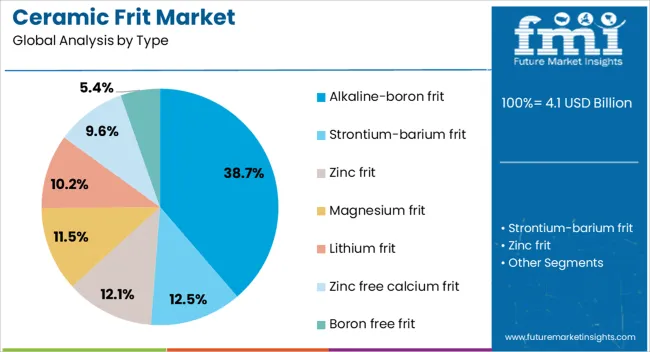
The Alkaline-boron frit type is projected to hold 38.70% of the Ceramic Frit market revenue share in 2025, making it the leading type. This dominance is being driven by its superior chemical stability, thermal resistance, and compatibility with various glass substrates. Growth has been supported by increasing adoption in both functional and decorative applications, where precise melting characteristics and strong adhesion properties are critical.
The segment has benefited from ongoing improvements in formulation that allow for consistent quality and enhanced color uniformity in glass products. Alkaline-boron frits are preferred in manufacturing environments that require repeatable performance, durability under thermal stress, and minimal defect rates.
Furthermore, industrial processes that integrate frits into coated or laminated glass have favored this type due to its versatility and long-term reliability As demand for high-quality architectural and decorative glass continues to rise, the Alkaline-boron frit segment is expected to maintain its leading position.
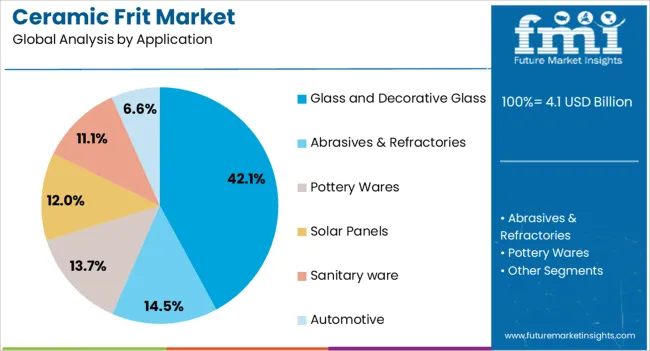
The Glass and Decorative Glass application segment is expected to account for 42.10% of the Ceramic Frit market revenue in 2025, emerging as the largest application area. This growth is being driven by rising demand for aesthetically enhanced and functional glass in both residential and commercial construction projects. The segment has benefited from the ability of ceramic frits to provide vibrant colors, intricate designs, and improved durability against mechanical and chemical stresses.
Demand has also been supported by consumer preference for customized glass patterns and high-performance glazing solutions that combine energy efficiency with decorative appeal. As architects and designers increasingly specify frit-enhanced glass for facades, partitions, and decorative installations, the segment has grown in significance.
The compatibility of ceramic frits with advanced glass processing methods, including tempering and laminating, has further strengthened adoption Moving forward, the segment is expected to sustain leadership as urban development and premium architectural projects continue to expand.
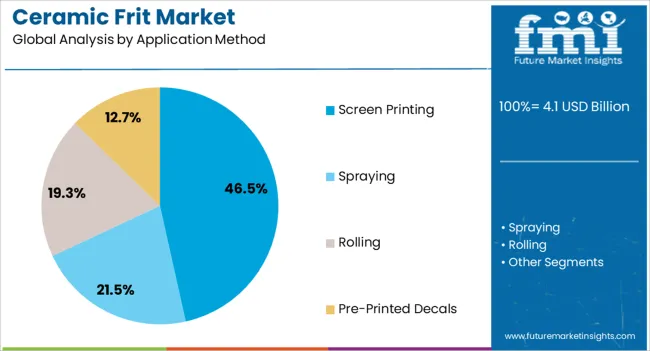
The Screen Printing application method is projected to hold 46.50% of the Ceramic Frit market revenue share in 2025, making it the dominant method. Growth in this segment has been driven by its ability to deposit frit patterns with precision and consistency on various glass and ceramic surfaces. The method allows high-resolution designs, uniform thickness, and strong adhesion, which are critical for both decorative and functional applications.
Industrial adoption has been facilitated by the scalability of screen printing processes and their compatibility with high-speed production lines. Additionally, screen printing supports versatile patterning options and is cost-effective for medium to large-scale production runs.
As manufacturers seek processes that minimize waste, ensure repeatability, and maintain high product quality, screen printing has emerged as the preferred application method With increasing demand for visually appealing and functional glass products in construction, automotive, and consumer segments, the screen printing method is expected to maintain its leadership in the application methods category.
Ceramic frit is a composition of multiple raw materials, mostly of inorganic origin, and is produced by melting and quenching in water. Ceramic frit compounds are vitreous and water-insoluble. Ceramic frit is fused in a special oven and granulated into powder form after being cooled and quenched in water. Ceramic frit is a key component used in the compounding of ceramic glazes and enamels. There various benefits of using ceramic frit in glazes and enamels.
Ceramic frit serves the purpose of rendering insolubility to soluble materials in a glaze mixture. This provides protection against bloating and warping and compromising the glaze's homogeneous nature. The process of “fritting” using ceramic frit compositions reduces or completely negates the harmful effects of toxic raw materials. Ceramic frit helps protect workers and improve process safety by decreasing the toxicity of raw materials. For example, lead is a part of raw materials creating dangers of poisoning and toxicity for ceramic workers. However, lead ceramic frit decreases the overall toxicity of raw lead. Moreover, ceramic frit has a much better consistency for glaze production compared to individual raw materials, which may have significantly different chemical and physical properties.
Ceramic frit is widely used in the glass industry. Manufacturing ceramic frit glass involves applying ceramic frit to the glass using methods such as screen printing. This is done before the glass is put through the process of tempering or heat strengthening. After being tempered or heat strengthened, the ceramic frit enamel fuses with the glass surface, resulting in the creation of a permanent coating. This coating is highly resistant to damage or removal by acts such as scrubbing, scratching, cleaning etc.
Considering these aspects of the Ceramic Frit, the study of the trends and forecasts of the Ceramic Frit market becomes an important read.
Ceramic frit has various applications and end uses. For example, the ceramic frit is used in the ceramic whiteware industry as a glaze component. Ceramic frit is used as a flux in the formulation of ceramic colors in the glass decorating industry. For the abrasives and refractory industries, the ceramic frit is brought to use as a bonding agent. In the solar energy industry, the ceramic frit is utilized in the inks and pastes that are used to manufacture solar panels. Ceramic frit patterns baked onto glass also help to act as the contact point for adhesion between the glass and a surface on which the glass is required to be fixed.
This is a common application of ceramic frit in the automotive sector. There are various architectural and commercial applications of silk-screened ceramic frit glasses. The benefits of ceramic frit glasses are wide-ranging. Ceramic frit glasses do not suffer from discolouration or staining because of exposure to the sun, deposits of volatile material or condensation owing to the chemical resistance properties of ceramic frit. Ceramic frit glass is available in different color schemes, thus providing good visual and aesthetic appeal to buildings, whether used in interior sections or exteriors. The design and type of ceramic frit glass chosen to be installed can be used to control light transmission and solar heat gain inside buildings.
Interior applications of ceramic frit glass include glass doors, glass ceilings, lavatories and shower enclosures, elevator walls, and handrails. Ceramic frit glass can also be used in curtain walls, glazing systems, partitions and other architectural interiors. The control of light transmittance and solar heat gain has huge benefits for energy efficiency, as it improves aesthetics and saves on air conditioning costs. Thus the various benefits provided by ceramic frit in terms of physical and chemical attributes for the buildings sector, architectural decoration, and energy efficiency savings will drive the growth of the Ceramic Frit market.
The demand for Ceramic Frit is set to grow at a fast pace in the next five to ten years as the demand for high-quality glass, ceramic ware, sanitary ware and solar panels grows. Asia Pacific region is expected to be significant for the Ceramic Frit market, as it is witnessing rapidly increasing demand for decorative ceramic frit glass. The region also boasts the largest demand for solar panels and has large-scale automotive production.
North America is also a large market for Ceramic Frit with a robust market for architectural decoration using ceramic frit glass. The market for ceramic frits in Europe remains steady, with stable demand patterns. China, India, Japan, the US, the UK, and Germany, are some of the key countries to watch in the Ceramic Frit market.
Examples of some of the market participants identified in the Ceramic Frit market include,
The research report presents a comprehensive assessment of the market and contains thoughtful insights, facts, historical data and statistically supported and industry-validated market data. It also contains projections using a suitable set of assumptions and methodologies. The research report provides analysis and information according to market segments such as geographies, applications and industries.
The report is a compilation of first-hand information, qualitative and quantitative assessments by industry analysts, and inputs from industry experts and industry participants across the value chain. The report provides an in-depth analysis of parent market trends, macro-economic indicators and governing factors along with market attractiveness as per segments. The report also maps the qualitative impact of various market factors on market segments and geographies.
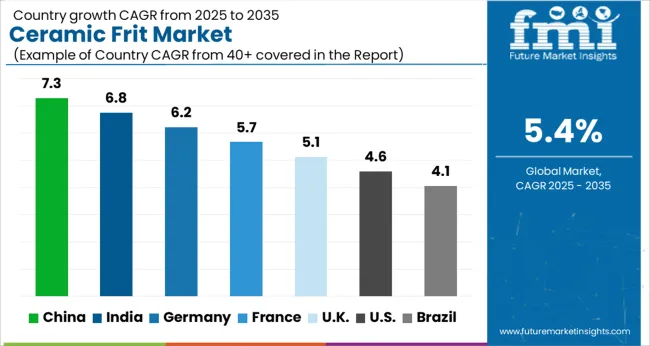
| Country | CAGR |
|---|---|
| China | 7.3% |
| India | 6.8% |
| Germany | 6.2% |
| France | 5.7% |
| UK | 5.1% |
| USA | 4.6% |
| Brazil | 4.1% |
The Ceramic Frit Market is expected to register a CAGR of 5.4% during the forecast period, exhibiting varied country level momentum. China leads with the highest CAGR of 7.3%, followed by India at 6.8%. Developed markets such as Germany, France, and the UK continue to expand steadily, while the USA is likely to grow at consistent rates. Brazil posts the lowest CAGR at 4.1%, yet still underscores a broadly positive trajectory for the global Ceramic Frit Market. In 2024, Germany held a dominant revenue in the Western Europe market and is expected to grow with a CAGR of 6.2%. The USA Ceramic Frit Market is estimated to be valued at USD 1.5 billion in 2025 and is anticipated to reach a valuation of USD 2.4 billion by 2035. Sales are projected to rise at a CAGR of 4.6% over the forecast period between 2025 and 2035. While Japan and South Korea markets are estimated to be valued at USD 189.2 million and USD 118.0 million respectively in 2025.
| Item | Value |
|---|---|
| Quantitative Units | USD 4.1 Billion |
| Type | Alkaline-boron frit, Strontium-barium frit, Zinc frit, Magnesium frit, Lithium frit, Zinc free calcium frit, and Boron free frit |
| Application | Glass and Decorative Glass, Abrasives & Refractories, Pottery Wares, Solar Panels, Sanitary ware, and Automotive |
| Application Method | Screen Printing, Spraying, Rolling, and Pre-Printed Decals |
| Application Method | Screen Printing, Spraying, Rolling, and Pre-Printed Decals |
| Regions Covered | North America, Europe, Asia-Pacific, Latin America, Middle East & Africa |
| Country Covered | United States, Canada, Germany, France, United Kingdom, China, Japan, India, Brazil, South Africa |
| Key Companies Profiled | Torrecid Group, Fusion Ceramics Inc, Garibaldi Glass Inc., Futura Ceramics Pvt. Ltd., Compagnie de Saint-Gobain S.A., Multiver Ltée, Supreme Glazes Private Limited, Tokan Material Technology Co.,Ltd., Cerfrit SA, and Color Esmalt, S.A |
| Additional Attributes |
The global ceramic frit market is estimated to be valued at USD 4.1 billion in 2025.
The market size for the ceramic frit market is projected to reach USD 7.0 billion by 2035.
The ceramic frit market is expected to grow at a 5.4% CAGR between 2025 and 2035.
The key product types in ceramic frit market are alkaline-boron frit, strontium-barium frit, zinc frit, magnesium frit, lithium frit, zinc free calcium frit and boron free frit.
In terms of application, glass and decorative glass segment to command 42.1% share in the ceramic frit market in 2025.






Our Research Products

The "Full Research Suite" delivers actionable market intel, deep dives on markets or technologies, so clients act faster, cut risk, and unlock growth.

The Leaderboard benchmarks and ranks top vendors, classifying them as Established Leaders, Leading Challengers, or Disruptors & Challengers.

Locates where complements amplify value and substitutes erode it, forecasting net impact by horizon

We deliver granular, decision-grade intel: market sizing, 5-year forecasts, pricing, adoption, usage, revenue, and operational KPIs—plus competitor tracking, regulation, and value chains—across 60 countries broadly.

Spot the shifts before they hit your P&L. We track inflection points, adoption curves, pricing moves, and ecosystem plays to show where demand is heading, why it is changing, and what to do next across high-growth markets and disruptive tech

Real-time reads of user behavior. We track shifting priorities, perceptions of today’s and next-gen services, and provider experience, then pace how fast tech moves from trial to adoption, blending buyer, consumer, and channel inputs with social signals (#WhySwitch, #UX).

Partner with our analyst team to build a custom report designed around your business priorities. From analysing market trends to assessing competitors or crafting bespoke datasets, we tailor insights to your needs.
Supplier Intelligence
Discovery & Profiling
Capacity & Footprint
Performance & Risk
Compliance & Governance
Commercial Readiness
Who Supplies Whom
Scorecards & Shortlists
Playbooks & Docs
Category Intelligence
Definition & Scope
Demand & Use Cases
Cost Drivers
Market Structure
Supply Chain Map
Trade & Policy
Operating Norms
Deliverables
Buyer Intelligence
Account Basics
Spend & Scope
Procurement Model
Vendor Requirements
Terms & Policies
Entry Strategy
Pain Points & Triggers
Outputs
Pricing Analysis
Benchmarks
Trends
Should-Cost
Indexation
Landed Cost
Commercial Terms
Deliverables
Brand Analysis
Positioning & Value Prop
Share & Presence
Customer Evidence
Go-to-Market
Digital & Reputation
Compliance & Trust
KPIs & Gaps
Outputs
Full Research Suite comprises of:
Market outlook & trends analysis
Interviews & case studies
Strategic recommendations
Vendor profiles & capabilities analysis
5-year forecasts
8 regions and 60+ country-level data splits
Market segment data splits
12 months of continuous data updates
DELIVERED AS:
PDF EXCEL ONLINE
Ceramic to Metal Assemblies Market Size and Share Forecast Outlook 2025 to 2035
Ceramic Textile Market Size and Share Forecast Outlook 2025 to 2035
Ceramic and Porcelain Tableware Market Size and Share Forecast Outlook 2025 to 2035
Ceramic Matrix Composites Market Size and Share Forecast Outlook 2025 to 2035
Ceramic Substrates Market Size and Share Forecast Outlook 2025 to 2035
Ceramic 3D Printing Market Size and Share Forecast Outlook 2025 to 2035
Ceramic Injection Molding Market Size and Share Forecast Outlook 2025 to 2035
Ceramic Tableware Market Size and Share Forecast Outlook 2025 to 2035
Ceramic Paper Market Size and Share Forecast Outlook 2025 to 2035
Ceramic Balls Market Size and Share Forecast Outlook 2025 to 2035
Ceramic Tester Market Size and Share Forecast Outlook 2025 to 2035
Ceramic Membranes Market Analysis - Size, Share and Forecast Outlook 2025 to 2035
Ceramic Barbeque Grill Market Analysis - Size, Share, and Forecast Outlook 2025 to 2035
Ceramic Tiles Market Growth & Trends 2025 to 2035
Ceramic Sanitary Ware Market Trends & Forecast 2025 to 2035
Ceramic Transducers Market Growth - Trends & Forecast 2025 to 2035
Leading Providers & Market Share in Ceramic Barbeque Grill Industry
Ceramic Ink Market
Ceramic Coating Market Growth – Trends & Forecast 2024-2034
Ceramic Additives Market

Thank you!
You will receive an email from our Business Development Manager. Please be sure to check your SPAM/JUNK folder too.
Chat With
MaRIA